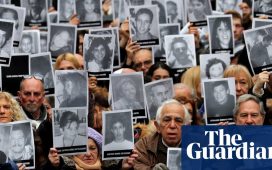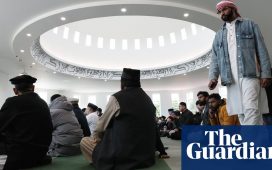The trial of a former Islamic militant accused of forcing hundreds of women into sexual slavery has opened at the international criminal court, with prosecutors seeking a lengthy jail sentence for crimes against humanity and war crimes.
Al Hassan Ag Abdoul Aziz Ag Mohamed Ag Mahmoud, 42, was transferred to the court’s custody more than two years ago from Mali, where he had been held by local authorities for more than a year.
The former extremist fighter is accused of torture, extrajudicial punishments and participation in a policy of forced marriage, which the court argues “led to repeated rapes and sexual enslavement of women and girls”.
He also been charged with persecution on the grounds of gender – a potentially pathbreaking move welcomed as a “historic step” and a “milestone for justice” by campaigners.
The alleged offences were committed during a six-month period when the Malian city of Timbuktu was occupied and ruled by radical Islamist groups in 2012 and 2013.
Al Hassan remained impassive throughout the early part of the hearing, which was televised, speaking in Arabic only to return the greeting of Judge Antoine Kesia-Mbe Mindua and say he understood the charges against him.
The former militant’s defence lawyers told the court al Hassan was suffering form post-traumatic stress disorder and was unfit to stand trial. Restrictions due to the Covid-19 pandemic had meant a full psychological assessment had not been carried out, they argued.
Timbuktu fell to a coalition of Tuareg rebels and Islamist militant factions, including al-Qaida in the Islamic Maghreb and a local group called Ansar Dine, in mid-2012. They enforced a harsh version of sharia law in areas under their control, banning music, forcing women to wear the burqa, preventing girls from attending school and demolishing saints’ graves.
Al Hassan joined Ansar Dine shortly before its occupation of the city and led a force of religious police, prosecutors say.
Born in a village north of Timbuktu, Al Hassan is also alleged to have worked closely with the religious tribunals set up by the occupiers to impose a harsh version of Islamic law, and is accused of participating in the torture of detainees.
The extremists withdrew from Timbuktu when French soldiers advanced in January 2013. Al Hassan fled Mali; according to court documents, he later rejoined his former comrades and was eventually detained by French troops after a gun battle in the north of Mali.
Fatou Bensouda, the lead ICC prosecutor, has previously said she hoped the trial of Al Hassan would “address the untold suffering inflicted upon the Malian population and … [send] a strong message to all those, wherever they are, who commit crimes which shock the conscience of humanity”.
Al-Hassan’s defence team have previously argued that Al Hassan was too minor an actor to justify trial at the ICC, that the alleged crimes were unrepresentative and that the prosecution unfairly targeted the Islamic faith.
The trial is only the second of an Islamist militant at the ICC. Ahmad al-Faqi al-Mahdi, a senior militant in Timbuktu during the occupation, was sentenced to nine years in prison by the ICC in 2016 for his role in the destruction of world-famous religious shrines and monuments in Timbuktu.
Mahdi pleaded guilty to the crime and apologised. He said he had been overtaken by evil spirits and urged Muslims not to follow his example.
Mali remains plagued by Islamic militancy and has been plunged into a political crisis in recent weeks, further undermining efforts to restore security by local troops, a large French force and UN peacekeepers.

A successful prosecution of Al Hassan would be a boost to the ICC, but is unlikely to end criticism from some quarters. The US has threatened an economic and legal offensive against the institution following a recent decision by judges to open an investigation into war crimes in Afghanistan.
Chile Eboe-Osuji , the president of the court, said the punitive measures announced by the US secretary of state, Mike Pompeo, last month were an attempt at coercion that went against international law as well as domestic law in the US and elsewhere.
“This is unlawful … In any liberal democracy, or even not so liberal democracies, you pick up a statute book and it will tell you that it is against the law to coerce a court of law in order to have justice the way you want it,” Eboe-Osuji said in an interview with the Guardian. “Even in the US itself, the law forbids that form of conduct.”
The US has said it will impose visa restrictions on the ICC officials involved in the investigation and their families. Additionally, the administration announced a counter-investigation into the ICC for alleged corruption.






